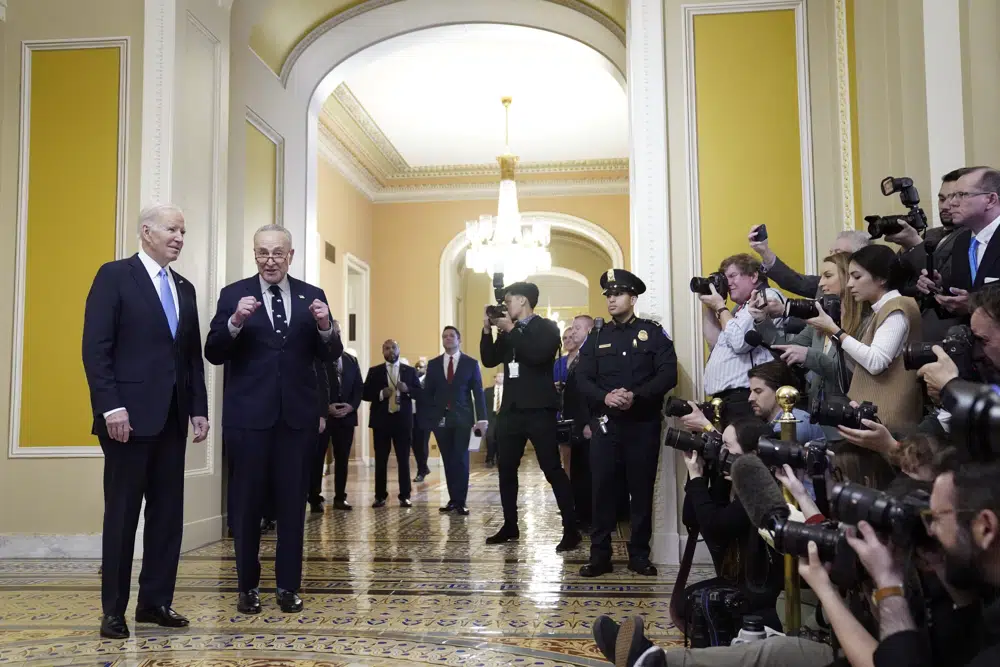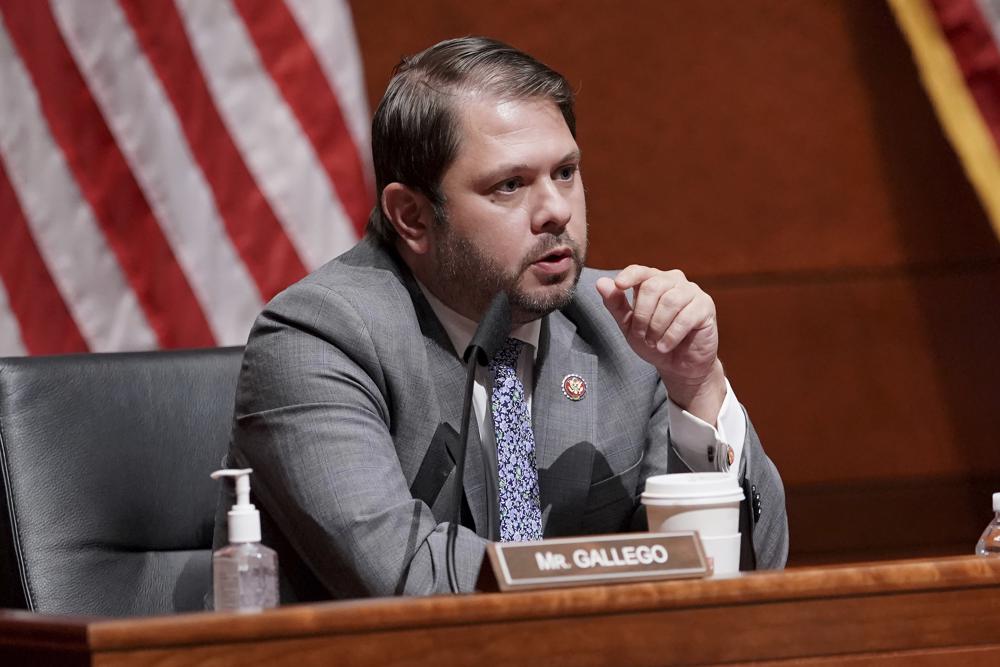Donald Trump faces questions about whether he’ll drag down the Republican Party after his indictments

Donald Trump’s grip on the Republican faithful was evident from the moment he left the federal courthouse in Miami last week. Fresh off becoming the first former president to face criminal charges levied by the government he once oversaw, Trump’s motorcade moved through a crowd of hundreds of mostly adoring fans. He met more supporters at a Cuban restaurant in Little Havana, a Miami neighborhood that, like much of south Florida, has swung toward Republicans in recent years. A federal indictment on charges of mishandling the nation’s most sensitive national security secrets would doom any other White House hopeful. But Trump’s reception in Miami — and the more than $7 million he raised after the indictment — was a reminder of the central tension coursing through the Republican Party as the 2024 presidential primary gets underway. For now, no one comes close to Trump in his command of the voters who will decide the GOP’s nominee next year. But Trump’s path beyond the primary is far more perilous as he faces significant and growing questions about his ability to appeal to a broader, more moderate set of voters in a possible general election matchup against President Joe Biden. If Trump fails, he risks not just losing the White House contest but also dragging down other Republican candidates on the ballot as the party aims to retake the U.S. Senate and keep the House. Former Maryland Gov. Larry Hogan is among those warning Republicans that what is popular in a primary may not carry the general election. The frequent Trump critic backed a moderate Republican to succeed him in last year’s governor’s race. But Trump’s preferred candidate carried the primary and was soundly defeated in the general election, a result that played out in key races across the country. “We had three losing cycles in a row,” Hogan said. “It’s pretty hard to lose the White House, but we did it. It’s pretty hard to lose the House, the Senate, and the White House, but we did that also. And in the last election when we should have won the Senate back, picked up governor seats, and picked up 50 seats in the House … Republicans did not make gains really.” Trump is not the only GOP contender facing such concerns. Florida Gov. Ron DeSantis’ national electability has been called into question after he signed into law a state ban on abortions performed after six weeks, delighting conservatives but leaving him as an outlier among broader voters. While many Americans back some restrictions on abortion, especially after the first trimester, many do not agree with the most extreme measures pushed in Republican-led states such as Florida, according to polling that also showed most Americans support a federal law allowing access to abortion nationwide. DeSantis also alienated some Republicans when he appeared to dismiss Russia’s brutal invasion of Ukraine as a “territorial dispute,” comments he later had to walk back. No one in the race, however, carries the same level of baggage as Trump, particularly after the latest indictment, which follows charges in New York City that he paid hush money to porn actor Stormy Daniels to cover up an affair. He’s unlikely to attract new support after the allegations in Florida, which center on allegations that he took and refused to return boxes of classified documents, including some that could put military members and other sources at risk if disclosed. The hand-wringing over the GOP’s future began well before Trump’s latest indictment. In announcing her presidential campaign in February, former South Carolina Gov. Nikki Haley, who was Trump’s ambassador to the United Nations, was blunt in addressing the party’s general election challenge. “We’ve lost the popular vote in seven of the last eight presidential elections,” she said. “Our cause is right, but we have failed to win the confidence of a majority of Americans.” Since Trump’s federal indictment in Miami, some of his rivals have begun to test how far they can go in criticizing him, positioning themselves in a way that may be helpful in a general election but also tempering their remarks by blasting the Department of Justice for bringing charges. While Trump’s rivals may not be ready to fully take him on, the party establishment is increasingly active in trying to block his acolytes from being nominated in down ballot races or encouraging hopefuls to change the subject from its losing messages of the past. The Republican National Committee, for example, conducted a review of the GOP’s recent performance. A draft report, which did not mention Trump by name, concluded that the party needs to move beyond “relitigating previous elections,” an apparent allusion to the incessant but debunked claims he won the 2020 presidential contest. The National Republican Senatorial Committee, the campaign arm of the Senate GOP, also has said it’s shifting tactics after opting to sit out last year’s primary elections and let voters decide the nominees. After failing to retake Senate control, the organization now says it will play in primaries if needed, providing money and other resources to candidates it believes have the best chance to win a general election. The organization already got news it hoped for when Doug Mastriano, a far-right Pennsylvania lawmaker who was endorsed by Trump last year and lost badly to the Democratic governor candidate, opted not to run for the Senate in 2024. Republicans are hopeful that former hedge fund CEO David McCormick, who lost last year’s primary to another Trump-backed candidate, will run again and take on Democratic Sen. Bob Casey. Trump, who has falsely called the charges against him a political prosecution, insists that he had redefined the GOP, saying earlier this year that “the old Republican Party is gone, and it’s never coming back.” The former president and his supporters point to his 2016 victory as evidence of his ability to win, noting he won Ohio and Florida when the GOP nominees in 2012 and 2008 could not and was the first Republican presidential candidate to win Michigan, Wisconsin, and Pennsylvania in decades. “We forever revolutionized the electoral map for Republicans,” Trump
Katie Britt and Tom Cotton lead bipartisan letter to Biden Administration about surge of Mexican steel

U.S. Senators Katie Britt and Tom Cotton, along with a bipartisan group of 11 of their Senate colleagues, sent a letter to Secretary of Commerce Gina Raimondo and U.S. Trade Representative Katherine Tai urging them to take action against the surge of Mexican steel imports, which they claim is unsustainable. The Sens. claim that the rising steel imports from Mexico raise grave concerns in America’s steel industry and steel communities such as those in Alabama. They also claim that this surge violates a 2019 agreement between the United States and Mexico negotiated by the Trump Administration. The letter contends that the United States deserves and should demand fair treatment from all trading partners, including its friends. “We urge the Biden administration to immediately begin consultations under the 2019 agreement to address this surge of Mexican steel and return imports to ‘historic volumes of trade,’ with quotas, if necessary,” the Senators wrote. “However, if the Mexican government refuses to remedy this breach, we regretfully urge the administration to consider other mechanisms to ensure compliance and protect American jobs, including the reapplication of Section 232 tariffs.” “The Administration has a responsibility to strongly enforce trade agreements to ensure fairness for hardworking Americans,” said Sen. Britt. “This unprecedented, unacceptable surge in Mexican steel imports is endangering good-paying Alabama jobs and negatively impacting communities across our nation. Additionally, our domestic iron and steel industry is critical for our national security. I will continue to fight to grow opportunities for families in every corner of Alabama and America, while keeping our homeland safe and strong.” Alabama still has a significant iron and steel industry. The iron and steel industry is an original economic engine for the state and supports approximately 15,000 jobs and indirectly supports more than 76,000 jobs, including subcontractors and suppliers. The average annual Alabama wage in the industry is nearly $100,000. Every two Alabama iron and steel industry jobs also supports ten additional jobs throughout the supply chain. Co-signing the letter are Senators Sherrod Brown (D-Ohio), John Boozman (R-Arkansas), Bob Casey (D-Pennsylvania), Thom Tillis (R-North Carolina), Tammy Baldwin (D-Wisconsin), Ted Budd (R-North Carolina), Elizabeth Warren (D-Massachusetts), Tina Smith (D-Minnesota), Rick Scott (R-Florida), Marco Rubio (R-Florida), and J.D. Vance (R-Ohio). The American Iron and Steel Institute (AISI) says that imports of finished steel increased by more than 18 percent in January compared with December. Mexico was the second-largest supplier (behind Canada) of finished and semi-finished steel to the U.S. in January. Mexico shipped 456,000 tons of steel to the U.S. in January – an increase of 10 percent from December. Britt is also a member of the National Security and International Trade and Finance Subcommittee of the Senate Committee on Banking, Housing, and Urban Affairs. To connect with the author of this story or to comment, email brandonmreporter@gmail.com.
Joe Biden rallies Senate Democrats, endorses Republican measure

President Joe Biden visited the Senate on Thursday to demonstrate unity among Democrats — but he ended up endorsing a Republican priority instead. With Democrats acknowledging they cannot get much done in the closely divided Congress, Biden has pledged to try to find areas where the two parties can agree. He made good on that promise in remarks at a caucus luncheon, telling senators that he will sign a GOP-backed measure to overturn changes to the criminal code in the District of Columbia. Biden later tweeted: “I don’t support some of the changes D.C. Council put forward over the mayor’s objections — such as lowering penalties for carjackings. If the Senate votes to overturn what D.C. Council did — I’ll sign it.” Accompanying Biden as he left the luncheon, Senate Majority Leader Chuck Schumer said he believes “we can get a lot of good bipartisan stuff done in these two years” and that Democrats “are filled with unity, optimism — and optimism about 2024.” Even so, Schumer’s Democratic Senate has been largely immobilized this year as the newly Republican House has shown little appetite for compromise. In addition, a string of Senate Democrats have been absent due to health issues, and some moderate senators facing reelection next year are voting with Republicans. While Schumer gained a coveted extra seat for his party in the November elections, bringing the margin to 51-49, Democrats have not yet been able to use their majority to advance any of their policy goals. Schumer has repeatedly focused on Democratic accomplishments in the last Congress, helped by the then-Democratic-led House, in lieu of making promises about the current session. “If the last two years focused on getting our agenda passed into law, one of the focuses of our lunch will be on how the next two years will be about implementing that agenda,” Schumer said on the Senate floor Thursday morning as he previewed Biden’s visit. In the absence of Democratic legislation, Republicans are finding some success advancing their own policy goals — by forcing votes on Biden administration regulations that they see as overly burdensome. The Republican resolution that Biden said he will support would override the District of Columbia’s effort to overhaul how the city prosecutes and punishes crime as the local murder rate has skyrocketed. The House passed the same measure last month with some Democratic support. As they left the caucus meeting with Biden, several Democratic senators said they will support, or are considering supporting, the Republican effort to repeal the changes to the D.C. criminal code. “If anything, we should be increasing penalties for certain offenses,” Sen. Bob Casey of Pennsylvania said. He said he will vote to overturn the changes to the D.C. code. On Wednesday, the Senate voted to overturn a new rule set by the Department of Labor over the way asset managers consider climate change and “environmental, social and governance” factors in investments for retirement plans. It was able to pass with the support of Democratic Sens. Joe Manchin of West Virginia and Jon Tester of Montana, who are both up for reelection next year. Biden has said he will veto that and keep the rule in place. Republicans are forcing the simple-majority votes by using the Congressional Review Act, which allows Congress to overturn certain regulations that have been in place for a short time. Those votes are some of the only policy measures that have been considered this year, as Schumer has put a raft of judicial and executive branch nominations up for votes instead of legislation that has little chance of becoming law. Democrats have had to hold back on some of the more controversial nominations, as well, as members of the caucus have had extended absences. New Pennsylvania Sen. John Fetterman is gone for several weeks dealing with clinical depression after he suffered a stroke last year. California Sen. Dianne Feinstein said Thursday that she has been hospitalized in San Francisco with a case of shingles. And Pennsylvania Sen. Bob Casey returned from a short absence this week after undergoing surgery for prostate cancer. Schumer said Monday that Biden’s visit would also be focused on the contrast between Democratic policy priorities and House Republicans — and the dilemma that the House GOP faces as conservatives insist on budget cuts in exchange for raising the country’s debt limit, action that must come this year to avoid a default. “We’ll talk to the president about how we can make sure Americans see that contrast,” Schumer said before Biden’s visit. Republished with the permission of The Associated Press.
Democrats kept the Senate this year, but 2024 may be harder

Democrats celebrating a successful effort to keep control of the U.S. Senate this year will soon confront a 2024 campaign that could prove more challenging. The party enters the next cycle defending 23 seats, including two held by independents who caucus with Democrats. That’s compared with just 10 seats that Republicans hope to keep in their column. Adding to the potential hurdles is that some 2024 contests are in states that have become increasingly hostile to Democrats, including Montana, Ohio, and West Virginia. Other Democratic-held seats are in some of the same hotly contested states that were at the center of this year’s midterms, such as Pennsylvania, Arizona, and Nevada. And while Democrats carried each of those races, they did so at great cost and with sometimes narrow margins. In Nevada, for instance, Democratic incumbent Sen. Catherine Cortez Masto won by less than 1 percentage point, or about 9,000 votes. For now, both parties insist they’re laser-focused on coming out on top in the December 6 Senate runoff in Georgia. But Democrats who are on the ballot in 2024 know that they could face fierce headwinds and are studying the results of this year’s election when the party outperformed expectations. For Nevada Sen. Jacky Rosen, a Democrat facing her first reelection campaign, that means staying focused on kitchen table issues and touting legislation like the infrastructure law and gun violence legislation signed by President Joe Biden. “We know that races are always close,” Rosen said in an interview. “We never take anything for granted.” The dynamics of the next Senate campaign could be influenced by a variety of outside factors, particularly the presidential election and the attention it generates. Biden, who turned 80 this month, has said his “intention” is to run for reelection and that he will make a final decision early next year. Former President Donald Trump has already announced a third White House bid, and multiple other Republicans are lining up to launch campaigns. The eventual nominee in each party could have a profound impact on down-ballot races, including those for Senate. But perhaps the biggest question for Senate Democrats seeking reelection will be who Republicans nominate as their opponents. The GOP lost several Senate elections this year, including those in Arizona, Pennsylvania, and Nevada, after Trump-backed candidates struggled to raise money and connect with a broader, more moderate range of voters during the general election. In Nevada, the Republican field to challenge Rosen has not begun to shape up but is expected to attract several contenders. One name receiving attention is Sam Brown, a former U.S. Army captain who was awarded a Purple Heart after being severely wounded in Afghanistan. Brown ran for Senate this year and put up a strong challenge in the Republican primary before losing to Adam Laxalt, who lost in the general election to Cortez Masto. Richard Hernandez, who was Brown’s campaign adviser, said, “He has committed to his supporters that he will never stop fighting for their issues, but he has not made any decisions as to whether that involves a future run for office.” Also in the southwest, Arizona Sen. Kyrsten Sinema, a centrist Democrat, will be up for reelection. The race, like other recent statewide contests in Arizona, is expected to be very competitive. But Sinema is likely to first face a well-funded primary challenger after angering much of the Democratic base by blocking or watering down progressive priorities like a minimum wage increase or Biden’s big social spending initiatives. She has not said whether she plans to run for reelection. Sinema’s most prominent potential primary challenger is U.S. Rep. Ruben Gallego, who has a long history of feuding with Sinema. Gallego has not announced his plans for 2024 but has made it no secret that he’s thinking about challenging Sinema. He even raised money on the prospect he might oppose Sinema. An independent expenditure group is also raising money, saying it will support grassroots organizations committed to defeating Sinema in a Democratic primary. Republicans hope a bruising Democratic primary might give them an opening to win the seat after losing Senate races in Arizona in three consecutive elections. Sinema is among a trio of moderate Senate Democrats who have sometimes used their leverage in an evenly divided chamber to block or blunt some of Biden’s plans and nominees. They will also be among the party’s most vulnerable incumbents in 2024. The other two senators, Joe Manchin of West Virginia and Jon Tester of Montana, will be running as Democrats in states that Trump handily carried in 2020. Manchin has already drawn a GOP challenger in U.S. Rep. Alex Mooney, who declared a week after winning reelection that he was setting his sights on higher office. Manchin has not yet said whether he’ll run for reelection. Republicans see Tester, a three-term senator, as vulnerable, and the opportunity to run for the seat could draw a fierce primary contest between former Interior Secretary Ryan Zinke and Rep. Matt Rosendale. Zinke, who won a House seat in this year’s midterm elections, said he will decide whether to run next year, and Rosendale declined to answer. Tester has not announced if he will seek another term but has said he anticipates 2024 will be just as tough as his last race in 2018, when he beat Rosendale in a close contest. In Pennsylvania, Democratic U.S. Sen. Bob Casey has not said whether he intends to run for a fourth term. Casey easily won reelection in 2018, but Pennsylvania has been competitive for Republicans, including in this year’s Senate race won by Democrat John Fetterman. One potential Republican challenger whose name has been floated in Pennsylvania is former hedge fund CEO David McCormick, who narrowly lost the Republican primary in this year’s race to celebrity heart surgeon Dr. Mehmet Oz. McCormick advisers declined to comment on that prospect. Conservative activist Kathy Barnette, who finished a close third in the Republican primary, didn’t respond to messages about whether she’s considering a 2024 campaign. Wisconsin, which saw Republican Sen. Ron Johnson narrowly win reelection this year, is also expected to have
Consumers get online tool to check nursing home vaccine data

Families and patients have a new online tool to compare COVID-19 vaccination rates among nursing homes, Medicare announced Tuesday, addressing complaints from consumer groups and lawmakers that the critical data had been too difficult to find. The information is now being made available through the “Care Compare” feature at Medicare.gov, the online tool for basic research on quality and safety issues at nursing homes. Consumers will be able to compare up to three nursing homes at the same time, and the webpage shows vaccination rates for residents and staff, as well as national and state averages. “We want to give people a new tool to visualize this data to help them make informed decisions,” Chiquita Brooks-LaSure, head of the Centers for Medicare and Medicaid Services, said in a statement. Nursing home residents are a tiny proportion of the U.S. population, but they have borne a crushing burden from the COVID-19 pandemic, accounting for more than 150,000 deaths, or roughly 1 in 5. Nationally, about 84% of residents are now vaccinated, which has slowed — but not totally prevented — the spread of the delta variant among frail patients. Nursing home staffers are the bigger concern since only about 64% are vaccinated, roughly the same share as the adult population. The virus commonly gets into facilities via staffers who have been exposed in nearby communities and unwittingly pass the infection on to residents. Medicare has been posting vaccination information online for months, but it was on a site designed for researchers and industry. One way to navigate it involved accessing a huge spreadsheet. Another approach called for hunting around on a map for little red dots that represented nursing homes. The statistics reveal big disparities in vaccination rates among states and sometimes wide differences within states and communities. Among the organizations complaining were Consumer Voice, which advocates for quality improvement in long-term care, and the Center for Medicare Advocacy, a watchdog group. Their concerns were echoed by two senior Democratic lawmakers, Sens. Ron Wyden of Oregon and Bob Casey of Pennsylvania. Citing an Associated Press report on breakthrough infections among nursing home residents, the two lawmakers urged Medicare to move quickly. Wyden chairs the Finance Committee, which oversees Medicare and Medicaid, and Casey heads the Aging Committee. The new online tool reminds consumers comparing facilities that higher percentages of vaccinated residents and staff “are better.” Information on COVID-19 vaccination rates is available just below each nursing home’s ratings. The data reflect the latest reported by nursing homes to the Centers for Disease Control and Prevention. Medicare officials say they are encouraged that even as the delta variant has swept across the country, outbreaks in nursing homes have not raced out of control as happened last year. They attribute that to the high rate of residents who have gotten their shots. Nursing home residents are expected to be top on the priority for booster shots as they become available. The nursing home industry says it fully supports vaccination of staffers and residents but that Medicare should also publish vaccine levels for hospitals and other medical care settings. Republished with the permission of the Associated Press.


